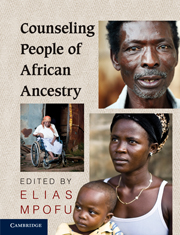Book contents
- Frontmatter
- Contents
- Contributors
- About the Editor
- Editorial Board
- Foreword
- Preface
- Acknowledgments
- PART 1 FOUNDATIONS OF COUNSELING IN AFRICAN SETTINGS
- PART 2 CONTEXTS OF COUNSELING
- 7 School Counseling
- 8 Counseling Students at Tertiary Institutions
- 9 Family Therapy within the African Context
- 10 Pastoral Care and Counseling
- 11 African Refugees: Challenges and Prospects of Resettlement Programs
- 12 Counseling Orphans and Vulnerable Children in Africa
- 13 Diversity Counseling with African Americans
- 14 Resolving Conflict in Africa: In Search of Sustainable Peace
- PART 3 COUNSELING APPLICATIONS
- PART 4 THE FUTURE OF COUNSELING IN AFRICAN HERITAGE SETTINGS
- Counseling People of African Ancestry Multiple Choice Answers
- Index
7 - School Counseling
Published online by Cambridge University Press: 05 August 2011
- Frontmatter
- Contents
- Contributors
- About the Editor
- Editorial Board
- Foreword
- Preface
- Acknowledgments
- PART 1 FOUNDATIONS OF COUNSELING IN AFRICAN SETTINGS
- PART 2 CONTEXTS OF COUNSELING
- 7 School Counseling
- 8 Counseling Students at Tertiary Institutions
- 9 Family Therapy within the African Context
- 10 Pastoral Care and Counseling
- 11 African Refugees: Challenges and Prospects of Resettlement Programs
- 12 Counseling Orphans and Vulnerable Children in Africa
- 13 Diversity Counseling with African Americans
- 14 Resolving Conflict in Africa: In Search of Sustainable Peace
- PART 3 COUNSELING APPLICATIONS
- PART 4 THE FUTURE OF COUNSELING IN AFRICAN HERITAGE SETTINGS
- Counseling People of African Ancestry Multiple Choice Answers
- Index
Summary
OVERVIEW. This chapter focuses on the circumstances under which counseling in schools developed in Africa, then examines research and practices in school counseling with some illustrative examples from countries such as Botswana, Malawi, South Africa, Zambia, and Zimbabwe. In addition, the organizational structures within which counseling services are conceived and delivered at the school level are analyzed. Finally, issues in the development of current school counseling services in sub-Saharan African schools are explored.
LEARNING OBJECTIVES
By the end of the chapter, the reader should be able to:
Outline the comparative evolutionary history of research and practice in sub-Saharan African countries.
Describe the current practices in school counseling in southern Africa.
Discuss the importance of professional, legal, and ethical considerations in the provision of school counseling services.
Articulate how the practice of school counseling in sub-Saharan African countries can be enhanced.
INTRODUCTION
As learners mature, they experience a variety of challenges for which they may need counseling. School is the place that learners spend most of their daytime, and therefore is a major influence in the development of learners. School is a community within the wider community, and what happens in school, in part, reflects the character of the community from which learners come. The broader community is always in transition, and presents with a myriad of challenges and opportunities that learners and their families transact, and that influence the quality of school life (Lazarus et al., 2006).
- Type
- Chapter
- Information
- Counseling People of African Ancestry , pp. 111 - 125Publisher: Cambridge University PressPrint publication year: 2011
- 2
- Cited by



